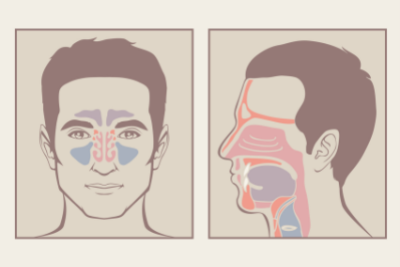Nosebleeds, at times, can bleed so profusely that they seem more serious than usual and can be frightening to deal with at home. Nosebleeds are so prevalent that up to 60 percent of the population has them. Though common and typically normal, it’s not unheard of for people to go to ER for treatment when the bleeding persists or occurs more frequently. For many people, it’s standard practice to go to the emergency room or a primary physician for symptoms or issues that affect their ears, noses, and throats.
ENT doctors/specialists, also known as otolaryngologists, are well versed in diagnosing and treating common and severe medical disorders that impair the function, health, and in some cases, the appearance of the nose, throat, or ears. They also provide medical and surgical care for seemingly common medical concerns that can impact daily living and overall quality of life like nosebleeds.
Nosebleeds Are the Most Common ENT Emergency
When blood suddenly starts gushing from the nose, one of the first reactions is to panic. After all, bleeding is a serious thing, right? It can be, but with epistaxis (nosebleeds), some bleeding episodes are to be expected.
Usually, nosebleeds are nothing to get too stressed about and are a common occurrence. Occasional nosebleeds are often caused by dry air and physical trauma to the face, especially the nose or the surrounding areas. However, they can also occur from having abnormal nasal tissues, polyps, enlarged turbinates, and sinus infections.
The following tactics are helpful in resolving occasional nosebleeds.
- Relax and don’t panic. Stress and anxiety can increase the pressure inside the vessels of the nose and make the hemorrhaging worse.
- Pinch the soft, fleshy area of the nose, right above the nostrils for 15-20 minutes without letting go.
- Breathe through the mouth until the blood stops leaking from the nose.
- Hold a cold compress or bag of ice on the bridge of the nose for a few minutes to encourage the hemorrhaging to stop.
- Avoid lying down. Remain in an upright position to decrease pressure inside of the nose and head to slow down the bleeding.
Once the bleeding stops, it’s a good idea to avoid touching, bumping, or jarring the nose for a few days to prevent the bleeding from recurring. The blood vessels inside the nose are sensitive. The slightest trauma can cause additional bleeding and make self-management difficult. If the above tactics don’t help after 20 minutes or you experience frequent nosebleeds, there may be an underlying medical issue that needs attention.
Other Causes of the Most Common ENT Emergency: Epistaxis
Everyone experiences nosebleeds at some point in their lives. Children are particularly prone to them. So are individuals with certain risk factors, such as the following:
- High blood pressure
- Allergic rhinitis
- Obstructive sleep apnea
- Upper respiratory infections
- Sinusitis
- Blood thinners
- Nose picking
- Blunt force trauma
- Nasal surgery
- Atherosclerosis
- Blowing the nose too hard
- Forceful sneezes or coughs
- Objects in the nose
- Changes in altitude
- Deviated septum
- Overuse of antihistamines or decongestants
- Recreational substance use, i.e., alcohol or street drugs
- Hormonal and fluid imbalances due to pregnancy
- Certain cancers
The most common reasons to seek out ENT care for nosebleeds include lacerations or sores, nasal polyps, bumps, broken blood vessels, enlarged turbinates, or severe dryness inside the nostrils that persists or is accompanied by nose, ear, or facial pain or nasal congestion. Nosebleeds are also common with infections and diseased nasal tissues.
When to See an ENT Specialist for Nosebleeds
Epistaxis can in some cases cause hemorrhaging so severe or frequent that at-home remedies are ineffective. ENT care is necessary to determine the cause and ensure proper treatment to prevent severe symptoms, complications, and recurrences. In children and adults, nosebleeds often occur from damaged vessels along the anterior septum of the nose.
Below are some signs that warrant ENT attention.
- Nose or face injury from car accidents, physical alterations, or other trauma
- Bleeding that doesn’t stop with self-care after 20-30 minutes
- Profuse bleeding
- Facial or body swelling
- Hemorrhaging that comes and goes
- Bleeding that’s accompanied by pain or nasal discharge, such as pus or mucus
- Nasal bleeding accompanied by feelings of lightheadedness or fatigue
In rare situations, nosebleeds can cause serious and potentially life-threatening issues, such as severe blood loss that is accompanied by difficulty breathing or shortness of breath, head pain or headaches, eye pain, body chills, and chest pain. If you or a loved one experience any of these concerns, please head to the nearest emergency room for immediate treatment. You should also contact your ENT doctor to schedule an appointment for an evaluation to rule out other common ear, nose and throat medical problems.
ENT Treatment for Nosebleeds (Epistaxis)

Advanced treatment methods include:
Balloon Sinuplasty is ideal for patients with nosebleeds concerns due to sinus infections or chronic sinus symptoms. The procedure widens the nostrils for optimal airflow to alleviate sinus inflammation and drainage issues that contribute to frequent nosebleeds.
Functional Endoscopic Sinus Surgery (FESS) is reserved for patients experiencing severe sinus and nasal infection symptoms that require more advanced and targeted treatment. FESS is combinable with other standard and advanced ENT procedures, such as in-office turbinate reduction, deviated septum repair, and nasal polyp surgery to correct multiple issues that restrict proper airflow, drainage, and trigger nosebleeds.
Septoplasty is ideal for patients with recurrent nosebleeds due to a deviated septum and turbulent airflow. To learn more about common ENT emergencies and the most beneficial treatment options, contact C/V ENT Surgical Group to discuss your ear, nose, and throat health concerns with world-renowned ENT experts, Dr. Alen Cohen and Dr. Bob Armin.

